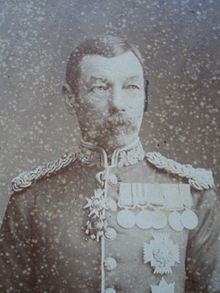Sir Drury Curzon Drury-Lowe
| Sir Drury Curzon Drury-Lowe | |
|---|---|

General Sir Drury Drury-Lowe
|
|
| Born | 3 January 1830 Aston-on-Trent, Derbyshire |
| Died | 6 April 1908 (aged 78) Denby, England |
| Allegiance |
|
| Service/branch |
|
| Years of service | 1854–1895 |
| Rank | Lieutenant-General |
| Unit | 17th Lancers (Duke of Cambridge's Own) |
| Commands held | Commander, 17th Lancers 1866–1878 Inspector of Cavalry at Aldershot 1885–1890 Colonel of the 17th Lancers 1892–1895 |
| Battles/wars | Crimean War (1855–1856): Battle of Chernaya River, Siege of Sevastopol. Indian Mutiny (1858–1859), Anglo-Zulu War (1879): Battle of Ulundi. Anglo-Egyptian War (1882). |
| Awards | GCB |
Lieutenant-General Sir Drury Curzon Drury-Lowe GCB (3 January 1830 – 6 April 1908) was a British army officer.
He was born on 3 January 1830 at Aston Lodge in Aston-on-Trent when he was called Drury Curzon Holden. His father was William Drury Holden and he changed his name to Lowe when he inherited the Locko Park inheritance.
He was educated privately at his home, Locko Park, near Spondon in Derbyshire, before gaining a BA at Corpus Christi College, Oxford. He joined the 17th Lancers in 1854 as a Cornet. He was commissioned a Lieutenant in November 1854 and Captain in November 1856.
He served in the Crimean War at the Battle of Chernaya River and was at the Siege of Sevastopol when it fell. He also saw service in the Indian Mutiny in 1858–1859. He purchased a commission as Major in 1862, and was promoted to Lieutenant-Colonel of the 17th Lancers in 1866. Sometime between 1862 and 1867 he assumed the surname Drury-Lowe in place of Lowe. He commanded the regiment for 12 years — most notably at the Battle of Ulundi, the last pitched battle of the Anglo-Zulu War. He was appointed CB in 1879. In the 1882 Anglo-Egyptian War, he received the surrender of Urabi Pasha. He was publicly thanked in the House of Commons, and knighted on 18 November 1882.
Drury-Lowe was Inspector of Cavalry at Aldershot from 1885 to 1890. He was promoted to Lieutenant-General in 1890. He became Colonel of the 17th Lancers in 1892. He retired in 1895 and was awarded the G.C.B. and then resided at Keydell House, Horndean occasionally writing to The Times. He died on 6 April 1908.
...
Wikipedia
